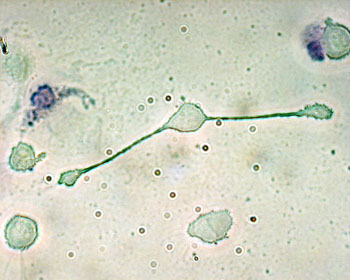HDL Increases Macrophage Immune Response
By Gerald M. Slutzky, PhD
Posted on 01 Dec 2016
While high-density lipoproteins (HDL) protect against atherosclerosis by inhibiting inflammation in the endothelial and smooth muscle cells that comprise the arterial wall, in immune macrophages HDL instead increases the inflammatory response.Posted on 01 Dec 2016
Investigators at Maastricht University (The Netherlands) reported in the November 17, 2016, issue of the journal Cell Metabolism that the passive depletion of cholesterol mediated by HLD generated an overt pro-inflammatory effect on cultures of mouse and human primary macrophages.

Image: A photomicrograph of a mouse macrophage of extending pseudopodia to engulf two particles, possibly pathogens (Photo courtesy of Wikimedia Commons).
These pro-inflammatory effects were confirmed in vivo in peritoneal macrophages from apoA-I (apolipoprotein A-I) transgenic mice, which had elevated HDL levels. In line with these findings, the innate immune responses required for clearance of Pseudomonas aeruginosa infection in lung were reduced in mice with low HDL levels.
"A main take-home message of our study is that HDL's functions are not as simple as initially thought, and appear to critically depend on the target tissue and cell type," said senior author Dr. Marjo Donners, assistant professor of pathology at Maastricht University. "In the end, it is the balance between its pro- and anti-inflammatory effects that determines clinical outcome. Future studies will have to evaluate the delicate balance of HDL's cell-specific effects in humans and in various pathologies to get more insights and to develop and improve therapeutic strategies."
"Whether HDL exerts beneficial or detrimental effects on the macrophage in a complex micro-environment, such as the atherosclerotic plaque, remains to be determined," said Dr. Donners. "For instance, in early atherosclerosis, a proper macrophage response could result in more effective scavenging and elimination of lipids and cellular debris, which may alleviate disease, whereas at later stages, such exaggerated responses may be detrimental because they destabilize the plaque. Moreover, the overt anti-inflammatory effects in other cell types should be taken into account, and it is the balance between these opposite effects of HDL that will determine clinical outcome for cardiovascular disease patients."
Related Links:
Maastricht University













